Folke Bernadotte Academy
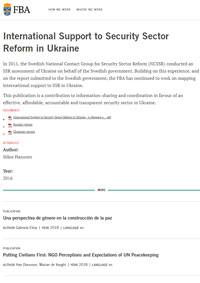
Folke Bernadotte Academy (FBA) is the Swedish government agency for peace, security and development. The Academy has the overall mission to support international peace and crisis management operations. In the area of Security Sector Reform, FBA offers:
- Policy, research and development
The FBA offers support to the work of the EU, UN and OSCE on SSR policy development. The FBA has developed a tool for SSR needs assessment and a handbook for SSR advisers. In addition, the FBA supports international research on SSR. - Training
The FBA offers a yearly SSR course as well as courses within the orbit of the European Security and Defence College. Furthermore, the FBA offers tailor-made SSR training on demand. - International work
The FBA seconds SSR experts to international peace missions. - Cooperation
The FBA coordinates a network of Swedish government agencies working on issues related to SSR. It also represents Sweden on the board of the International Security Sector Advisory Team (ISSAT).
For more information please
visit the site
UN Security Sector Reform Task Force
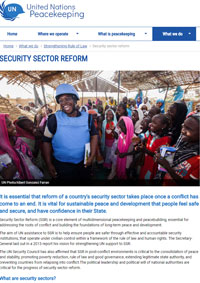
The United Nation’s Inter-Agency Task Force on Security Sector Reform (IASSRTF) brings together all UN agencies working on security sector governance issues. The Task Force was established by the Secretary-General of the United Nations in 2007 to promote an integrated, holistic and coherent United Nations security sector reform (SSR) approach that envisages assisting States and societies in establishing effective, inclusive and accountable security institutions so as to contribute to international peace and security, sustainable development and the enjoyment of human rights by all.
For more information please
visit the site
UN Department of Peacekeeping Operations
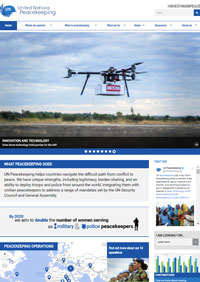
The Department of Peacekeeping Operations (DPKO) has been assisting in the reform of individual components of the security sector, such as police services, for decades.
Since 2007, DPKO has focused on supporting those efforts at the strategic level and in a holistic way, across all components.
DPKO’s Security Sector Reform Unit (SSRU), part of the Office of Rule of Law and Security Institutions, is the SSR focal point and technical capacity for the UN system as well as for national and international partners. The unit has responsibility for:
- providing political, strategic and technical assistance to peace operations involved in supporting national SSR efforts;
- supporting senior UN leaders to ensure SSR is integrated into the UN’s overall work;
- Acting as a global centre of excellence through the development of guidance and international norms;
- Developing SSR partnerships for the UN.
For more information please
visit the site
OSCE Polis
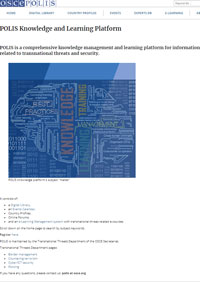
OSCE Polis is a digital library bringing together all aspects of international assistance in the areas of border security, counter terrorism, cyber security and policing, and wider law enforcement issues. OSCE Polis is a knowledge management tool created in response to the needs of the OSCE field operations staff involved in law enforcement activities and provides:
- Information resources — a repository of information on all policing-related activities previously or presently being undertaken in OSCE field operations. It identifies lessons learned, good practice and external sources of specialized knowledge;
- Experts Database — a database of international law enforcement experts available for short-term assignments, needs assessments, new mission start-up planning or inspections;
- Events Calendar — a section where all policing-related events, organized by the OSCE institutions and field operations are advertised, accompanied by relevant materials. The Events Calendar is closely interlinked with the Digital Library providing access to the related documents.
POLIS is an on-line resource centre for police and law enforcement officers, policy analysts, policy makers, evaluation experts, and donors in the field of policing and rule of law, helping them to plan reforms and access feedback on existing initiatives.
For more information please
visit the site
Transparency and Accountability Initiative
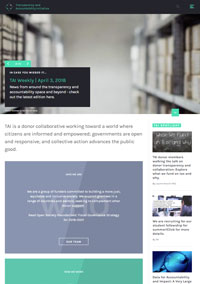
The Transparency and Accountability Initiative (T/A Initiative) is a donor collaborative working to expand the impact and scale of transparency, accountability and participation interventions.
For more information please
visit the site
Parliamentary Oversight of the Security Sector: Principles, Mechanisms, and Practices
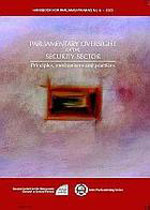
Parliaments have a vital role to play in the good governance of the security sector and the provision of transparent and accountable public security. This handbook is divided into eight sections, each containing several chapters and can be read in two different ways. A complete reading of the Handbook will provide the most comprehensive understanding of security issues and the role of parliamentary oversight. However, it is also possible to make a selective reading of those sections and chapters which are of particular concern to the user. The index and various cross-references are designed for this purpose. Throughout the Handbook, there are separate boxes which clarify complex issues in the main text, provide examples of laws or regulations, and highlight practices of parliamentary oversight of the security sector in various countries. At the end of most chapters, there is a section called “what you can do as a parliamentarian," where concrete recommendations are given. However, these recommendations must be observed from the national context.
Public Oversight of the Security Sector: A Handbook for Civil Society Organizations
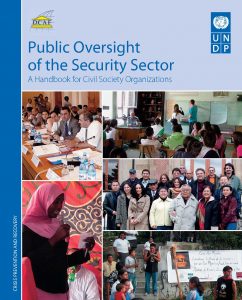
This Handbook provides structured guidance for civil society organisations (CSOs) on the role they can play in democratic security sector oversight. Although many CSOs have facilitated security sector reform processes in transition and post-conflict states, much of their potential remains untapped. Similarly, the longer term role CSOs play in maintaining a democratically-managed security sector is sometimes under-emphasised in the developed and developing worlds. The Handbook is designed primarily for civil society and non-governmental organisations. It is also relevant to democratic institutions, democratic representatives, policymakers, SSR practitioners, researchers, security sector institutions, the media, and international organisations partnering with CSOs on democratic security governance issues.
For more information please
download the document Eng
Security Sector Reform: Integrated Technical Guidance Notes
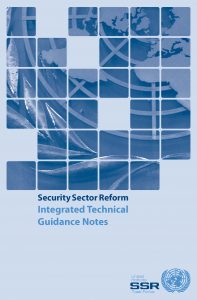
The UN SSR Integrated Technical Guidance Notes are a useful tool for anyone interested in Security Sector Reform and Democratic Security Sector Governance. The purpose of the Integrated Technical Guidance Notes (ITGNs) is therefore to foster a “One United Nations” approach to SSR by providing a common framework to guide United Nations support to nationally led SSR efforts.
For more information please
download the document Eng
Making Intelligence Accountable: Legal Standards and Best Practice for Oversight of Intelligence Agencies
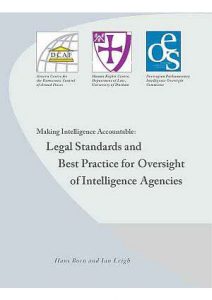
This publication classifies and evaluates the legal standards that currently exist regarding the democratic accountability of intelligence services. The publication also identifies and recommends best practices applicable to both transition countries and well-established democracies.
Overseeing Intelligence Services Toolkit
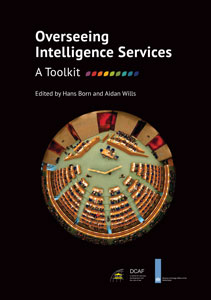
DCAF’s toolkit on overseeing intelligence services is a compendium of booklets (tools) that provides policy-relevant information on the establishment and consolidation of independent bodies to oversee state organisations involved in the collection, analysis, production and dissemination of intelligence in the national security domain.
Training Manual on Police Integrity
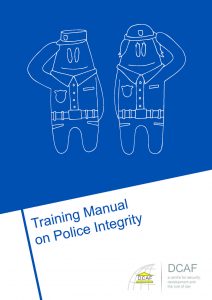
The Training Manual on Police Integrity aims to assist ministries of interior, police services and training institutions in developing their capacities to deliver integrity training to their staff. The Training Manual also provides guidance on how to build and sustain organizational integrity through effective planning and management of human resources and reform processes.
For more information please
download the document Eng
Toolkit on Police Integrity
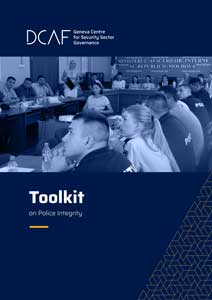
The Toolkit on Police Integrity aims to assist police services in designing effective measures to curb police corruption, increase their ability to fight crime, improve public security, and strengthen the rule of law and public trust in the police. The Toolkit contains chapters covering a range of topics, such as corruption and policing, supporting police officers facing ethical questions, internal control, external oversight and control, and capacity building.
Legislating for the Security Sector Toolkit: The European Code of Police Ethics
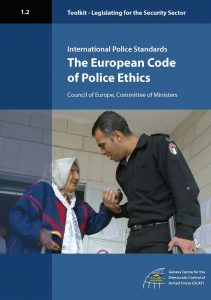
This toolkit contains the European Code of Police Ethics accompanied by commentaries and recommendations. The European Code of Police Ethics together with the Guidebook on Democratic Policing (OSCE) and the Ten Basic Human Rights Standards for Law Enforcement Officials (Amnesty International) can be considered as the main framework of international norms and standards for democratic policing.
For more information please
download the document Eng
Legislating for the Security Sector Toolkit: 10 Basic Human Rights Standards for Law
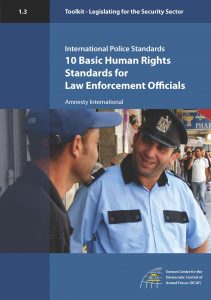
These ‘10 Basic Human Rights Standards for Law Enforcement Officials’ were prepared by Amnesty International in conjunction with police officials and experts from different countries. They are based on United Nations law enforcement, criminal justice and human rights standards. This document is intended to raise awareness amongst government officials, parliamentarians, journalists and non-governmental organizations of some fundamental standards which should be part of any police training and police practice.
For more information please
download the document Eng
Legislating for the Security Sector Toolkit: International Police Standards guidebook on Democratic Policing
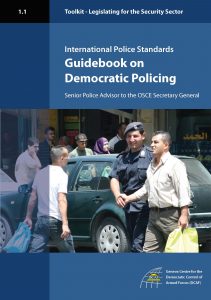
This toolkit contains international standards and principles of democratic policing. The guidebook is designed to assist OSCE staff dealing with police and law-enforcement issues as well as police practitioners and policy-makers working to develop and strengthen democratic policing. It serves as a reference to good policing practices and internationally adopted standards. The guidebook articulates the objectives of democratic police services and forces, the importance of their commitment to the rule of law, policing ethics, and human rights standards, the essential nature of police accountability to the law and to the society which they serve, and the need for their cooperation with the communities, recognizing that effective policing requires partnership with the communities being served. Furthermore, the guidebook elaborates on structural and managerial aspects within the police necessary in achieving and sustaining democratic policing.
For more information please
download the document Eng
Legislating for the Security Sector Toolkit: Police Legislation Model: The Swedish Police Act
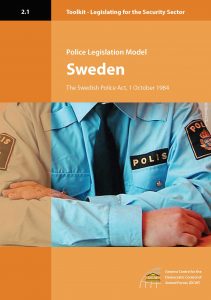
This booklet contains the Swedish police law in its original form as well as its articles reorganised by topic. This allows legislators to easily identify the specific topics that need to be covered in a police law and compare the different models.
For more information please
download the document Eng
Legislating for the Security Sector Toolkit: Police Legislation Model: The Japanese Police Law and The Police Duties Execution Law
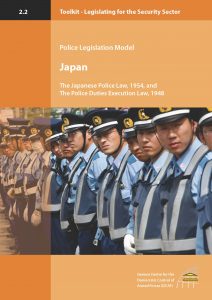
This booklet contains the Japanese police legislation in its original form as well as its articles reorganised by topic. This allows legislators to easily identify the specific topics that need to be covered in a police law and compare between different models of laws.
For more information please
download the document Eng
Legislating for the Security Sector Toolkit: Police Legislation Model: Republic of South Africa Police Service Act 68, 1995
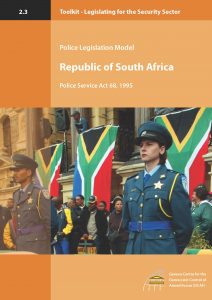
This booklet contains the South African Military Discipline Supplementary Measures Act in its original form as well as its articles reorganised by topic. This allows legislators to easily identify the specific subjects that need to be covered in such a law and compare the different models of laws.
For more information please
download the document Eng
International Human Rights Standards for Law Enforcement: A Pocket Book on Human Rights for the Police
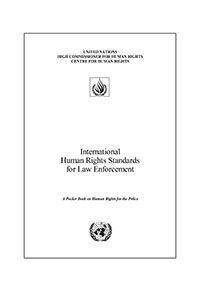 This "pocket book" is designed to provide a readily accessible and portable reference for police committed to the lawful and humane performance of their vital functions in a democratic society. The pocket book contains hundreds of relevant standards, reduced to common language and point-form, and drawn from over thirty international sources.
This "pocket book" is designed to provide a readily accessible and portable reference for police committed to the lawful and humane performance of their vital functions in a democratic society. The pocket book contains hundreds of relevant standards, reduced to common language and point-form, and drawn from over thirty international sources.
For more information please
download the document Eng
International Standards of Financial Oversight in the Security Sector
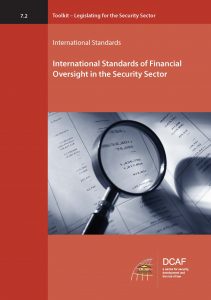
This Toolkit provides readers with easy access to internationally-adopted guiding principles, standards, and best practices of financial oversight of security sector institutions. The toolkit allows readers to access key international standards on budgeting and auditing in the security sector; compare existing practices and regulations in their countries with universally-accepted budgeting and auditing principles; use the international standards as a basis for proposals to political leaders and members of parliament for reforming the prevailing financial oversight system in the security sectors of their countries; and monitor and evaluate the performance of financial accountability institutions against international best practice.
For more information please
download the document Eng
Legislating for the Security Sector Toolkit: Understanding Intelligence Oversight
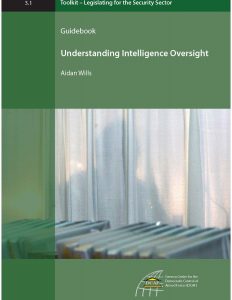
This guidebook provides an introduction on how democratic states govern their intelligence services. The toolkit demonstrates how states can govern their intelligence services in order to make sure that:
- They contribute effectively to the security of the state and its population,
- They are subject to democratic control,
- They are accountable to the populations they serve, and
- They respect the rule of law and human rights.
The guidebook provides short and simple answers to frequently asked questions on the activities of intelligence services, as well as the control and oversight of these
For more information please
download the document Eng
Legislating for the Security Sector Toolkit: Compilation of Good Practices for Intelligence Agencies and their Oversight
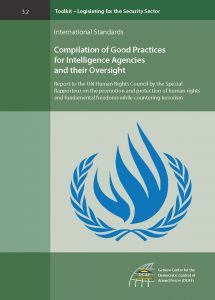
The Compilation of Good Practices within the Security Sector Toolkit highlights the legal and institutional frameworks and measures that ensure respect for human rights by intelligence agencies while countering terrorism. The toolkit also identifies international standards for intelligence governance.
For more information please
download the document Eng
Oversight and Guidance: Parliaments and Security Sector Governance
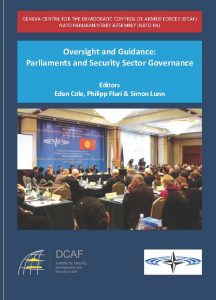
This third version of the DCAF-NATO PA ‘Vademecum’ underlines the essential role that parliaments must play in ensuring democratic oversight of the security sector. Updating key information on best practices related to parliamentary oversight and guidance of the security sector, the volume retains a special focus on defence affairs and puts the oversight role of parliament into political and military contexts. Aimed at democratic institutions within NATO partner-countries, it provides an introduction to the overarching principles of security sector reform and key oversight mechanisms and best practices.
For more information please
download the document Eng
Parliamentary Oversight of the Security Sector
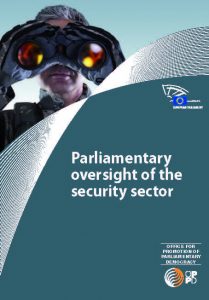
This paper represents a further addition to the series of publications on issues in parliamentary practice from the Office for Promotion of Parliamentary Democracy (OPPD). The main objective of this publication is to provide an overview of the main issues affecting parliamentary oversight and, more generally, democratic governance of the security sector in new and emerging democracies.
For more information please
download the document Eng
Financial Oversight of the Security Sector a Toolkit for Trainers
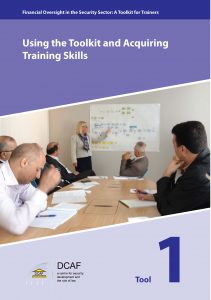
This Toolkit is designed for financial oversight practitioners who wish to gain access to best international practices in financial oversight of the security sector, improve their professional ability to financially oversee security sector institutions, acquire a more proactive attitude towards conducting thorough financial oversight activities of security sector institutions, and assert their authority in scrutinizing budgets and financial operations conducted by security sector institutions.
For more information please
download the document Eng
Democratic and Effective Oversight of National Security Services
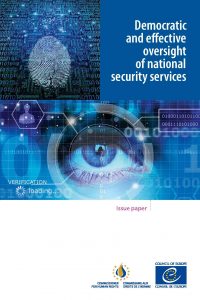
With the permission of the Council of Europe, DCAF has translated the Council of Europe Commissioner for Human Rights’ May 2015 Issue Paper on ‘Democratic and effective oversight of national security services’ (link to original source here) into several languages, some of which, including the English original, are available below. This issue paper focuses on the oversight of state bodies, including both autonomous agencies and departments/units of other government departments or the armed forces, that have a mandate to collect, analyse and disseminate intelligence within the borders of their state in order to inform decisions by policy makers, military commanders, police investigators and border/customs agencies about threats to national security and other core national interests. The Paper also includes a number of recommendations on the basis of the issues raised by this issue paper formulated by the Council of Europe Commissioner for Human Rights.
For further information on the Council of Europe and its publications please visit their web-site here.
Building Integrity and Reducing Corruption in Defence: A Compendium of Best Practices
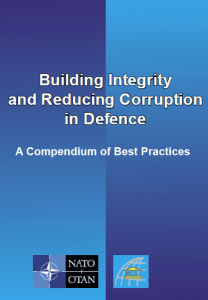
This compendium is the product of cooperation between Transparency International UK, the NATO Program for Peace team, and DCAF. The Compendium focuses on concepts and tools which ensure good practices in defence management and policy through “building integrity.” Designed primarily as an introduction and reference tool, defence personnel, civilians in the defence sphere, democratic institutions, and civil society will also find materials on building integrity and anti-corruption measures which are relevant to their own security governance activities.
Anti-Corruption Ethics and Compliance Handbook for Business
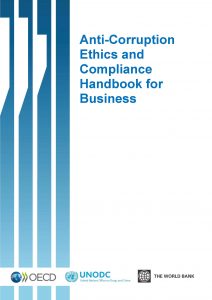
The Handbook has been developed to serve as a useful, practical tool for companies seeking compliance advice in one, easy-to-reference publication. The Handbook is divided into three sections. The first section provides an overview of the international anti-corruption framework, within which companies conducting international business must operate. The second section provides a brief introduction to how companies can assess their risk in order to begin developing an effective anti-corruption ethics and compliance programme. The third and most significant section brings together major business guidance instruments.
For more information please
download the document Eng
Good Practice Guidance on Internal Controls, Ethics and Compliance
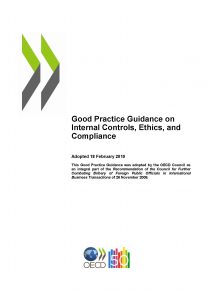
This Good Practice Guidance is addressed to companies for establishing and ensuring the effectiveness of internal controls, ethics, and compliance programmes or measures for preventing and detecting the bribery of foreign public officials in their international business transactions. Guidelines are also addressed to business organisations and professional associations which play an essential role in assisting companies in these efforts. It recognises that to be effective, such programmes, or measures, should be interconnected with a company’s overall compliance framework. This Guidance is intended to serve as non-legally binding guidance to companies in establishing effective internal controls, ethics, and compliance programmes or measures for preventing and detecting foreign bribery.
For more information please
download the document Eng
OECD Glossaries: Corruption: A Glossary of International Standards in Criminal Law
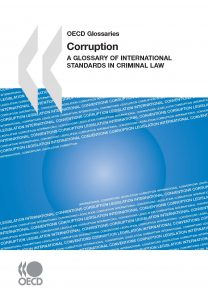
This Glossary explains the key elements required to classify corruption as a criminal act, according to three major international conventions: the OECD Convention on Combating Bribery of Foreign Public Officials in International Business Transactions; the Council of Europe’s Criminal Law Convention on Corruption; the United Nation’s Convention against Corruption. The specific purpose of this Glossary is to assist the countries of the OECD Anti-Corruption Network for Eastern Europe and Central Asia in their efforts to reform national anti-corruption criminal legislation according to the requirements of the above-mentioned conventions. This tool seeks to remedy the lack of knowledge about international law and recent developments in international treaties that some national legislators may face. It should be useful for legal practitioners in any country that aims to strengthen international cooperation and domestic rules to fight corruption.
For more information please
download the document Eng
Anti-Corruption Authority Standards
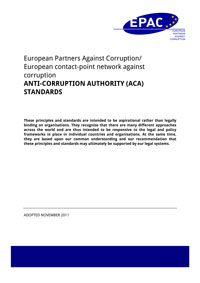
This document lists ten guiding principles and parameters on the notion of independence of Anti-Corruption bodies. These principles and standards are intended to be aspirational for, rather than legally binding on, organisations. They recognise that there are many different approaches across the world and are, thus, intended to be responsive to the legal and policy frameworks established in individual countries and organisations.
For more information please
download the document Eng
Handbook on Combating Corruption
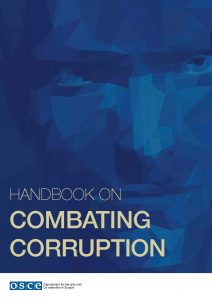
This handbook is a reference guide on available legal tools, the latest legislative and policy trends, and pertinent measures and practices to prevent and suppress corruption. The handbook is aimed at raising awareness of the range of international instruments available to national policymakers and anti-corruption practitioners.
For more information please
download the document Eng
Security Sector Governance and Reform Guidelines for OSCE Staff
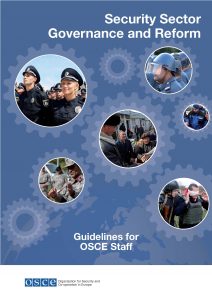
These guidelines provide OSCE staff with advice on supporting cross-dimensional approaches to security sector governance and reform (SSG/R). The purpose of such approaches is to promote a move away from the kind of fragmented support which has a limited impact and towards the practice of building on cross-dimensional synergies. This is done in order to provide coherent and effective support for the pursuit of common strategic SSG/R objectives. While the guidelines are designed for the use of OSCE staff, they may also be of relevance to other national and international actors seeking to enhance their support in the field of SSG/R.
For more information please
download the document Eng
International Conference of Ombuds Institutions for the Armed Forces (ICOAF)
.jpg)
The aim of ICOAF is to establish best practice and lessons learned related to the mandate, powers and functioning of these institutions. The initiative also reaches out to states that do not have an Ombuds institution for the military but have expressed an interest to learn from experiences from other states.
For more information please
visit the site
Legislating for the Security Sector Toolkit: The Canadian Security Intelligence Service Act
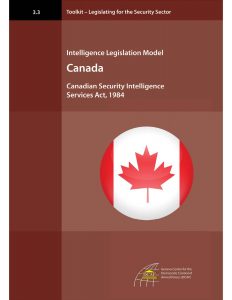
This booklet contains the Canadian Security Intelligence Service Act in its original form as well as the provisions of this legislation which are reorganised by topic. This allows lawmakers to easily identify the specific subjects that should be covered by legislation on intelligence services and compare different laws according to particular topics.
For more information please
download the document Eng
Legislating for the Security Sector Toolkit: The Netherlands’ Intelligence and Security Services Act
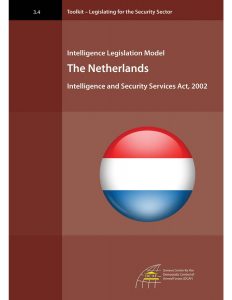
This booklet contains the Dutch Intelligence and Security Services Act in its original form as well as the provisions of this legislation which are reorganised by topic. This allows lawmakers to easily identify the specific subjects that should be covered by legislation on intelligence services and compare different laws according to particular topics.
For more information please
download the document Eng
Legislating for the Security Sector Toolkit: The Argentinian National Intelligence Law
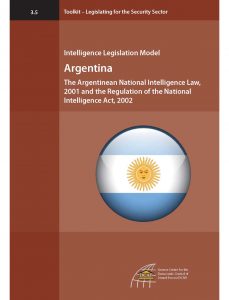
This booklet contains The Argentinian National Intelligence Law, 2001 and the Regulation of the National Intelligence Act, 2002 in its original form as well as the provisions of this legislation which are reorganised by topic. This allows lawmakers to easily identify the specific subjects that should be covered by legislation on intelligence services and compare different laws according to particular topics.
For more information please
download the document Eng
Legislating for the Security Sector Toolkit

The toolkit contains a number of booklets that provide norms and standards, guidebooks as well as practical examples of model laws in various areas of security sector legislation. This toolkit is primarily addressed to all those who intend to create new or develop existing security sector legislation. This includes parliamentarians, civil servants, legal experts and nongovernmental organisations. The toolkit may also be helpful to security officials and, as a reference tool, to researchers and students interested in security sector legislation.
For more information please
visit the site
Rule of law, justice, security and human rights
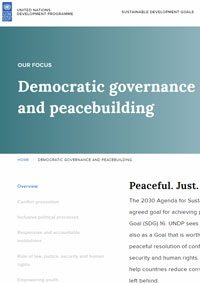
This is the UNDP web portal on democratic governance and peacebuilding. The portal contains information on key areas of UNDP’s rule of law and human rights work and provides tools and resources as well as useful links to other topics related to security sector governance.
For more information please
visit the site



